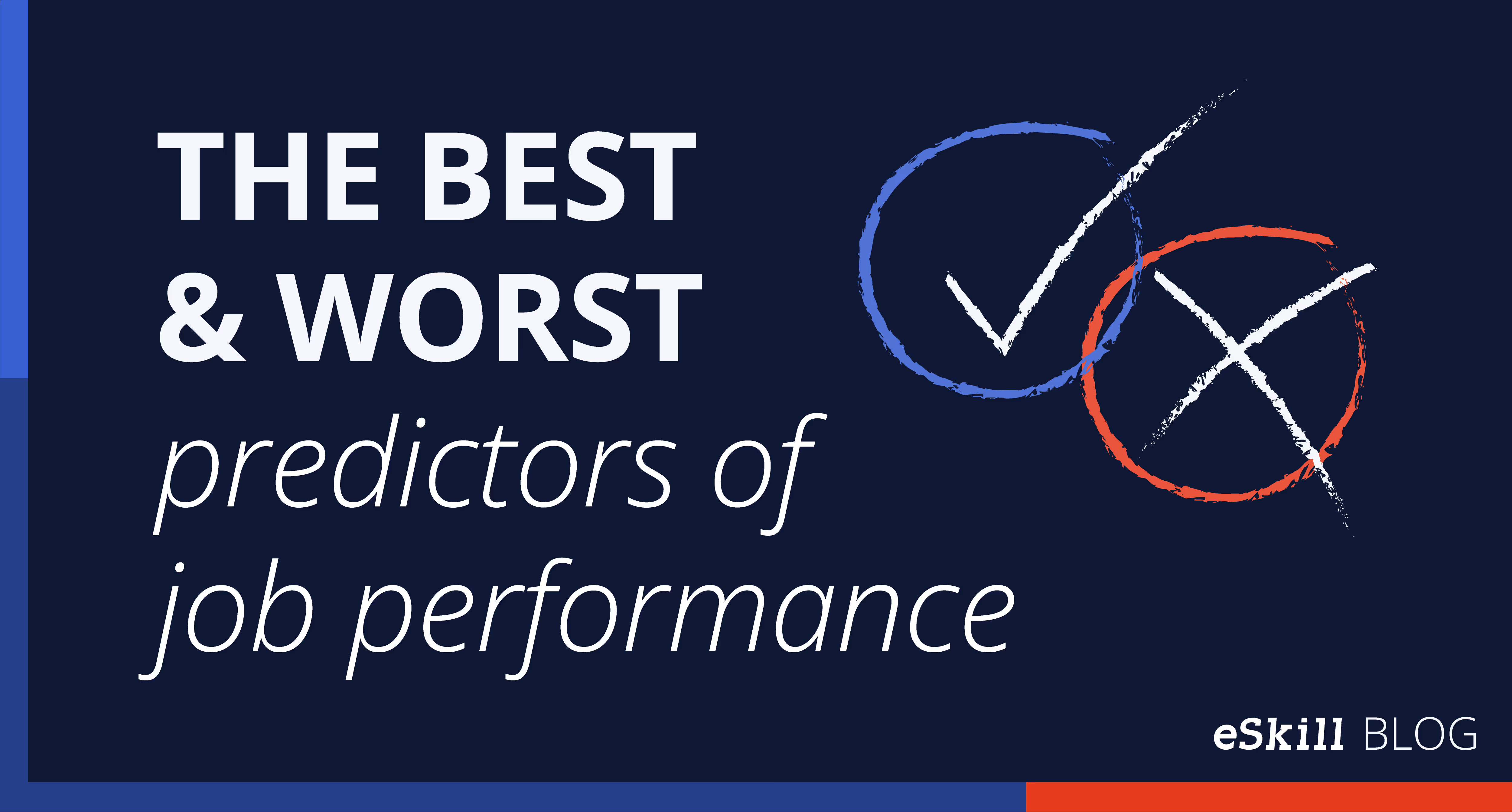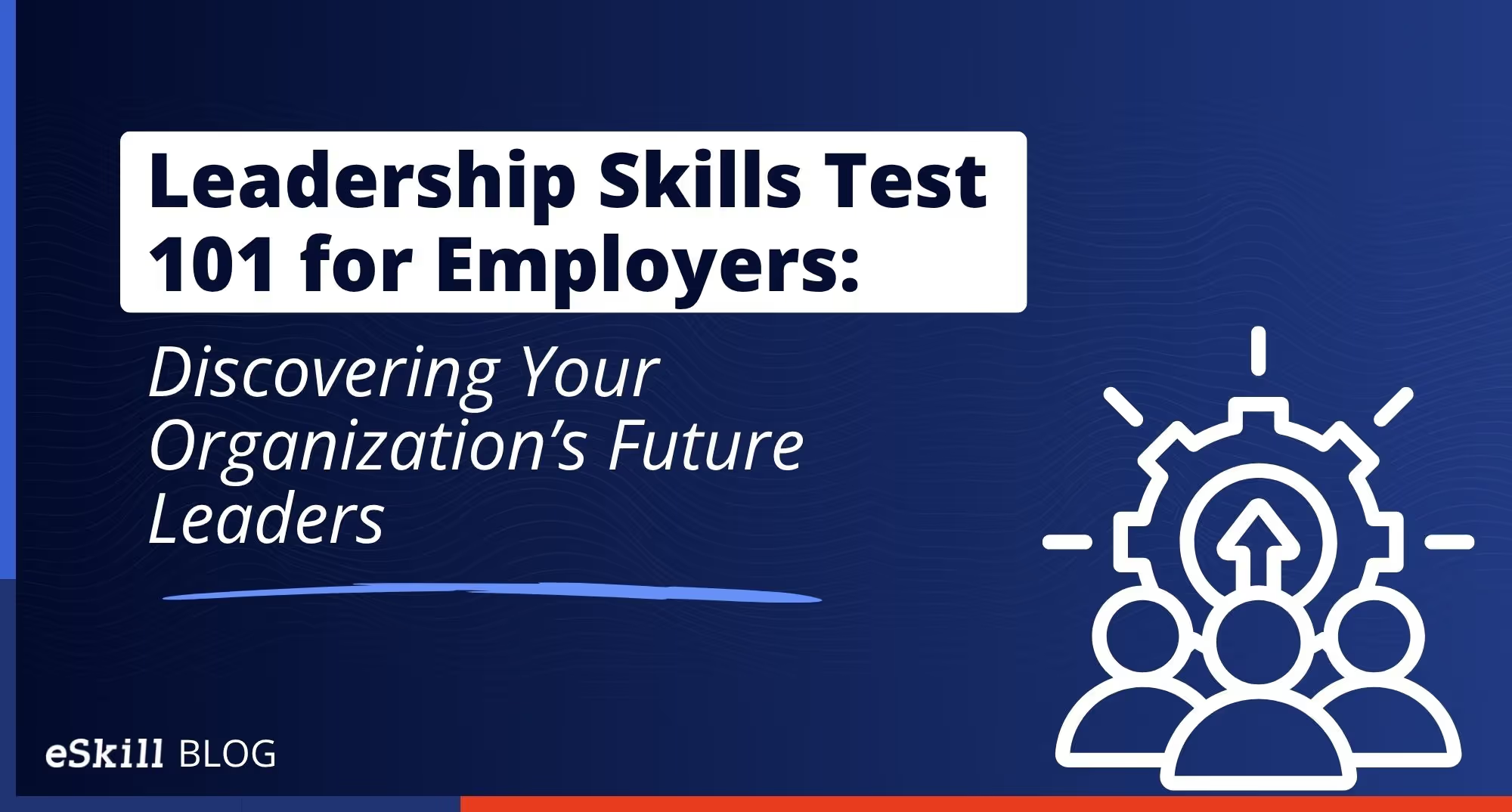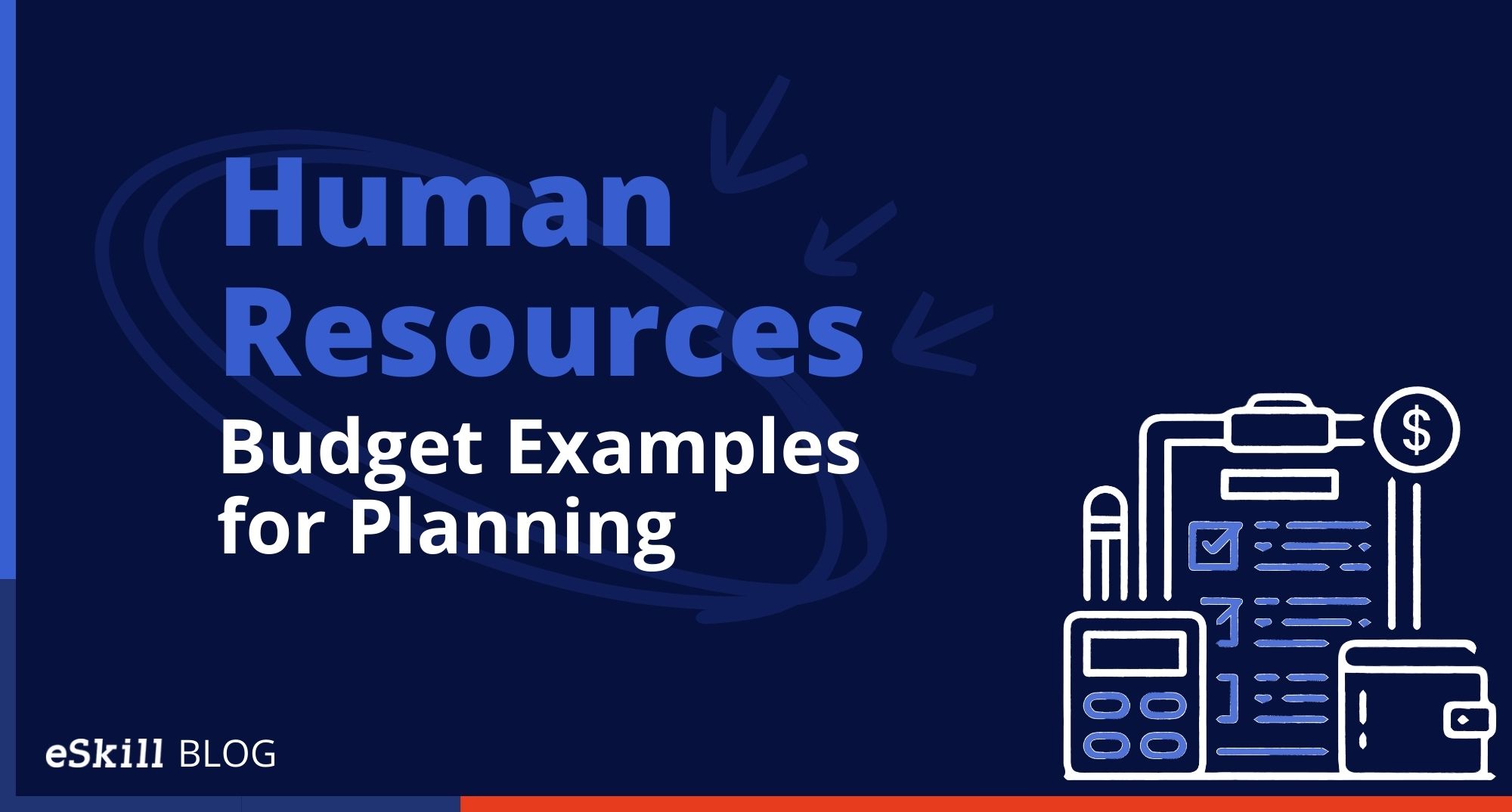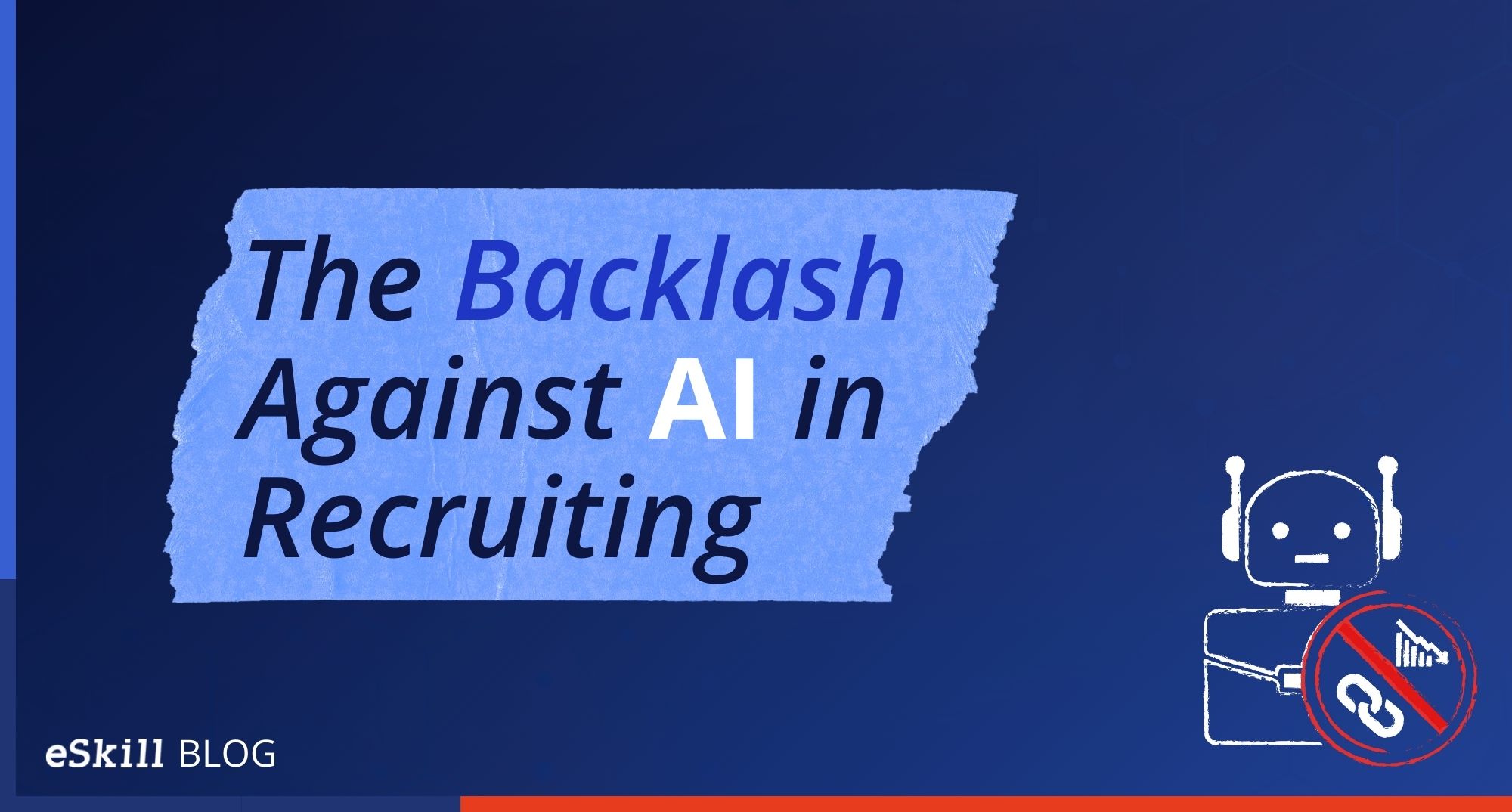Did you know “years of experience” is one of the worst predictors of job success? And yet it’s one of the first things recruiters look at on job resumes. First impressions — on which recruiters often form hiring decisions — are also one of the worst predictors of job performance. And let’s not even mention riddles. There are better predictors of job performance out there — including structured interviews and job-specific hard skills tests.
- Common hiring methods like unstructured interviews, years of experience, and first impressions are poor predictors of job performance.
- The most effective predictors of job success include structured interviews, job knowledge/work sample tests, and cognitive ability assessments.
- Combining assessments — especially work-specific testing — with structured interviews offers the most reliable and efficient hiring outcomes, and platforms like eSkill help streamline this approach for high-volume hiring.
Imagine you are given two eggs.
You have access to a 100-story building.
These eggs — unlike regular eggs — can be either very hard, or very fragile, meaning they may break if dropped from the first floor of the building, or they may not break if dropped from the 100th floor.
You need to figure out the highest floor of that 100-story building you can drop an egg from without the egg breaking. However, since you only have two eggs, once they both break, you’re done with the experiment.
What’s the minimum number of drops you need to make to arrive at the answer?
And does your head hurt yet?
Riddles like this one used to be infamous in interviews at Google, but they were banned at the company around 2013. Since — as then-VP of People Operations, Laszlo Bock, said in a 2013 New York Times interview — they predicted nothing about job performance and were “a waste of time.”
Hiring is difficult to get right, as any HR recruitment professional can tell you. A 1998 meta-analysis concluded that a typical unstructured employment interview only leads to the right hire about 57% of the time — so it’s only slightly more effective than flipping a coin.
While there are no hiring predictors that offer a 100% success rate, some are definitely better than others.
So, like Google’s riddles — a pretty much 0% predictor of job success — here are some more job predictors that may be a “waste of time.” And we’ll follow with some of the best — that, when used in combination, can lead to some pretty good hiring outcomes: improving productivity, boosting employee wellbeing, and also heightening retention rates.
For our rankings, we drew on a landmark 2022 meta-analysis published in The Journal of Applied Psychology, led by psychologist Paul R. Sackett and his colleagues. This comprehensive study synthesized findings from decades of research to identify which hiring methods best predict job performance. And we looked at a number of other sources of information — including historical trends in hiring practices, additional peer-reviewed psychological research, and anecdotes from prominent hiring professionals and companies (like Google above).
Worst Predictors of Job Performance
Some of the most relied-on assessments of job capability, like years of experience at previous roles and first impressions in interviews, are actually some of the worst predictors of hiring success — completely useless for determining whether a hire is good or not.
While unstructured interviews and tenure might feel useful as predictors of hiring success, they often fall short. The ease of their application (unstructured interviews don’t require much prep) also makes hiring managers lean toward short conversations and “gut” feelings to weed out candidates.
Here’s the reality: there are much more accurate predictors of hiring success that are also relatively easy to implement — especially when trying to filter out bad candidates in high-volume recruiting roles (hint hint: pre-hire tests). Read on to find out why “predictors” like unstructured conversations can’t truly help you distinguish a bad hire from a good one.
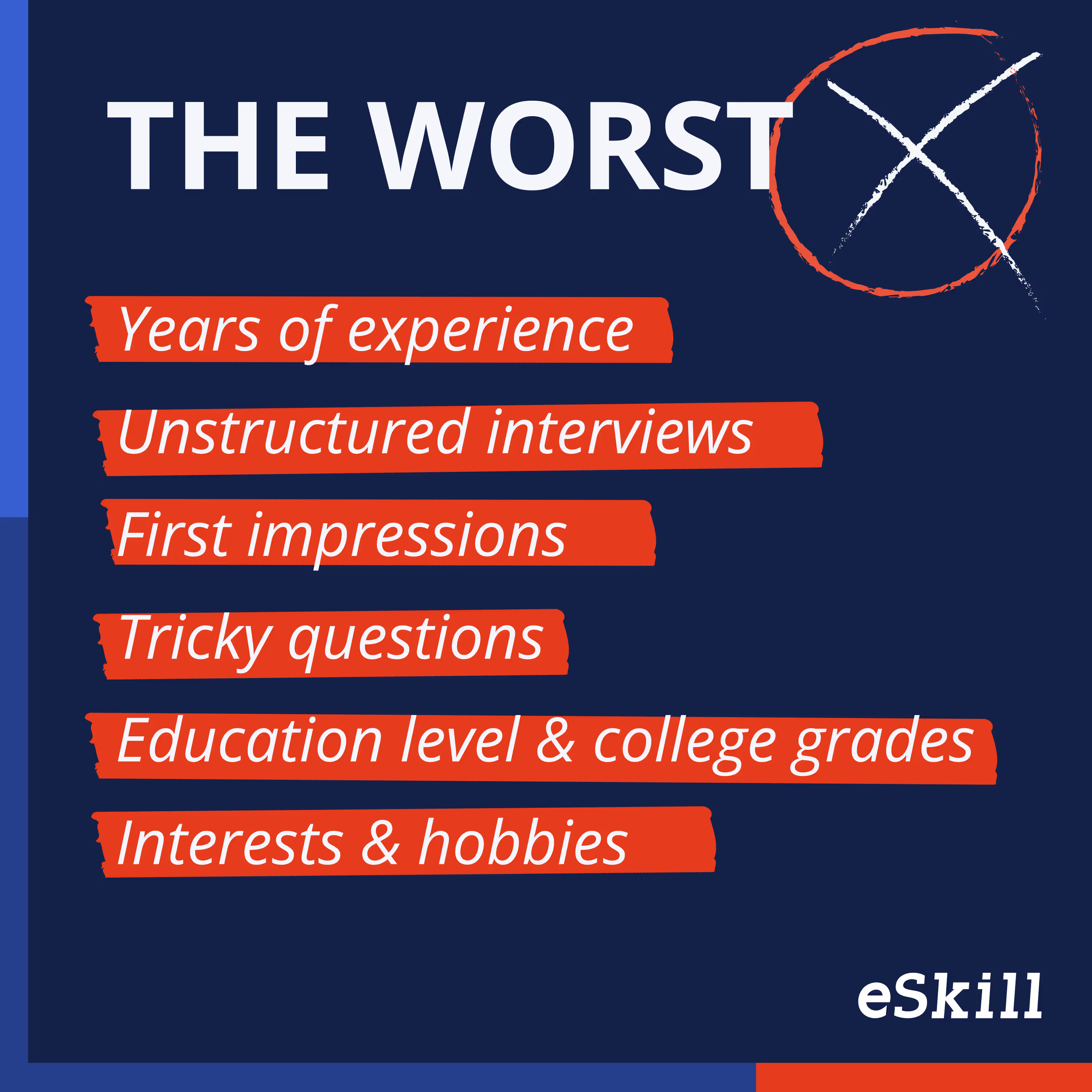
Years of experience
According to Sackett’s study, “years of experience” is one of the worst predictors of performance for new hires, ranking behind 22 other selection criteria. Sackett’s estimates are primarily a revision of a classic 1998 study by Schmidt & Hunter (a review of 85 years of personnel selection research), which similarly ranked years of experience far below structured interviews, work sample tests, and general mental ability in terms of predictive validity.
Surprised? You’re not alone. Despite being one of the most common hiring filters, “years of experience” fares only slightly better than personality traits like openness to experience, which had an even lower correlation with job performance. Personality research in the workplace continues to show that these measures are often poor stand-alone predictors.
Why is that? First of all, “years of experience” does not distinguish between high performers and low performers. In fact, it masks talent by relying on tenure rather than ability. Using “years of experience” as a gatekeeping metric can inadvertently filter out candidates who are fast learners, career switchers, or otherwise highly capable but have a nontraditional background.
The verdict? Relying on “years of experience” biases the hiring process toward incumbents, not necessarily the most qualified.
Unstructured interviews
Whenever you treat interviews like a free-flowing conversation, with no standard questions, no consistent scoring rubric, and no objective benchmarks, you end up rating candidates based on vibes, rather than concrete data. These “vibe checks” may feel intuitive, but they’re unreliable at best and biased at worst.
If you ask every applicant different questions, there’s no way to fairly compare their responses. This makes it easy to overweight charisma or social fit and overlook actual skill or job relevance.
Affinity bias also creeps in. Interviewers are more likely to rate candidates highly if they share similar backgrounds, interests, or personality traits, undermining diversity and merit-based hiring.
Unstructured interviews have a predictive validity that is only marginally better than flipping a coin. Structured interviews, by contrast, showed a much stronger correlation with job performance — we’ll cover what these look like in more depth later.
Without a structured format, interviewers tend to make “thin-slice” judgments — snap decisions based on looks, voice, or mannerisms — often in the first 10 seconds. This is what we’ll cover next.
First impressions
In one study (in which interviewers were themselves assessed), the findings revealed that one in three made a hiring decision within the first five minutes of meeting someone.
These are unlikely to yield great results, because like unstructured interviews, they’re based on superficial qualities — attractiveness, articulateness, affability, and assertiveness — known as the four “A’s.”
None of these criteria predict job success — and what’s more, some of the least qualified candidates can come off best in interviews (we’re not saying you’re hiring psychopaths when you rely on first impressions…but you’re definitely more likely to). Interviewers are apt to ignore red flags when someone gives a good interview, and are likely to rate aptitude and abilities higher than they should.
Tricky questions
For interviewers and interviewees alike, interviews can feel stale and impersonal. This may explain the fad for asking unexpected questions, such as “What is the first thing you’d do during a zombie attack?” or “How many kittens would fit inside a telephone booth?”
It’s fun, but there is no evidence that a candidate’s ability to answer these types of questions correlates to their performance. Riddles and random hypothetical scenarios are both pretty bad at revealing how someone will do on the job — and do we really need a study to back this up?
It’s no wonder Google, once famous for its brain teaser interview questions, banned the practice several years ago. According to their Senior VP of People Operations, the questions were “a complete waste of time,” and “don’t predict anything” when it comes to job success.
So next time you’re tempted to ask an interviewee what they would do if someone gave them an elephant they couldn’t buy or sell, maybe skip that question. (And perhaps think twice if they tell you they’re going to exploit the elephant for a profit).
Education level & college grades
If you went to college, you probably sweated over your grades and worked to boost them as high as you could. This effort is great for your GPA, but unfortunately, school performance is a poor hiring predictor.
And while some employers may take into account minimum GPAs or value degrees from “top” schools, studies show that academic performance or a school’s reputation both have very little correlation with on-the-job performance — except in the case of fresh graduates, where a modest correlation is observed. And by eliminating candidates based on GPA or their lack of a degree, employers may be missing out on skilled candidates who have the requisite abilities needed for the job.
Many companies have already made the move toward skills-based hiring rather than education-based hiring — not only because it’s more equitable, but because it’s more predictive of job performance.
Interests and hobbies
Compared to earlier work, the validity of interests and hobbies increased from 0.10 to 0.24 in Sackett’s study, a boost due to Sackett and his colleagues defining interests in a fit-based (rather than a general) way — that is, correlating personal interests to unique job demands. While that’s weaker than most other ranking factors, it’s a meaningful improvement.
But when it comes to general hobbies and correlations to job performance, they still rank near the bottom of the list, according to Sackett.
What does this mean for employers?
General hobbies aren't strong predictors. Someone’s love for cooking, hiking, or playing guitar may be interesting conversationally, but unless those activities reflect job-relevant interests (like analytical thinking, social interaction, or technical tinkering), they don’t reliably forecast performance.
However, job-aligned interests can help in fit-based hiring. One 2019 study found that matching candidates’ interests to specific job characteristics (e.g., investigative interests for data roles, artistic interests for design work) led to moderately better outcomes — especially for job satisfaction and tenure.
In short, while hobbies can help build rapport, they shouldn’t carry much weight in hiring decisions — unless they directly signal interests that align with the demands of the role. As a standalone metric, they remain one of the weakest predictors of performance.
Talk to sales

Best Predictors of Job Performance
For decades, hiring professionals treated cognitive ability as the gold standard for predicting job success. That belief came from that seminal 1998 study by Schmidt & Hunter that we mentioned earlier, which shaped modern hiring practices and dominated industrial-organizational (I/O) psychology for years.
The massive meta-analysis by psychologist Paul Sackett and his colleagues re-evaluated the evidence — and found that while cognitive ability still matters, it’s far from the only thing that does. In fact, several other methods outperform or complement it in meaningful ways, especially when it comes to real-world hiring across different industries and roles.
So what does actually predict job performance best today? Here’s what the latest research tells us.
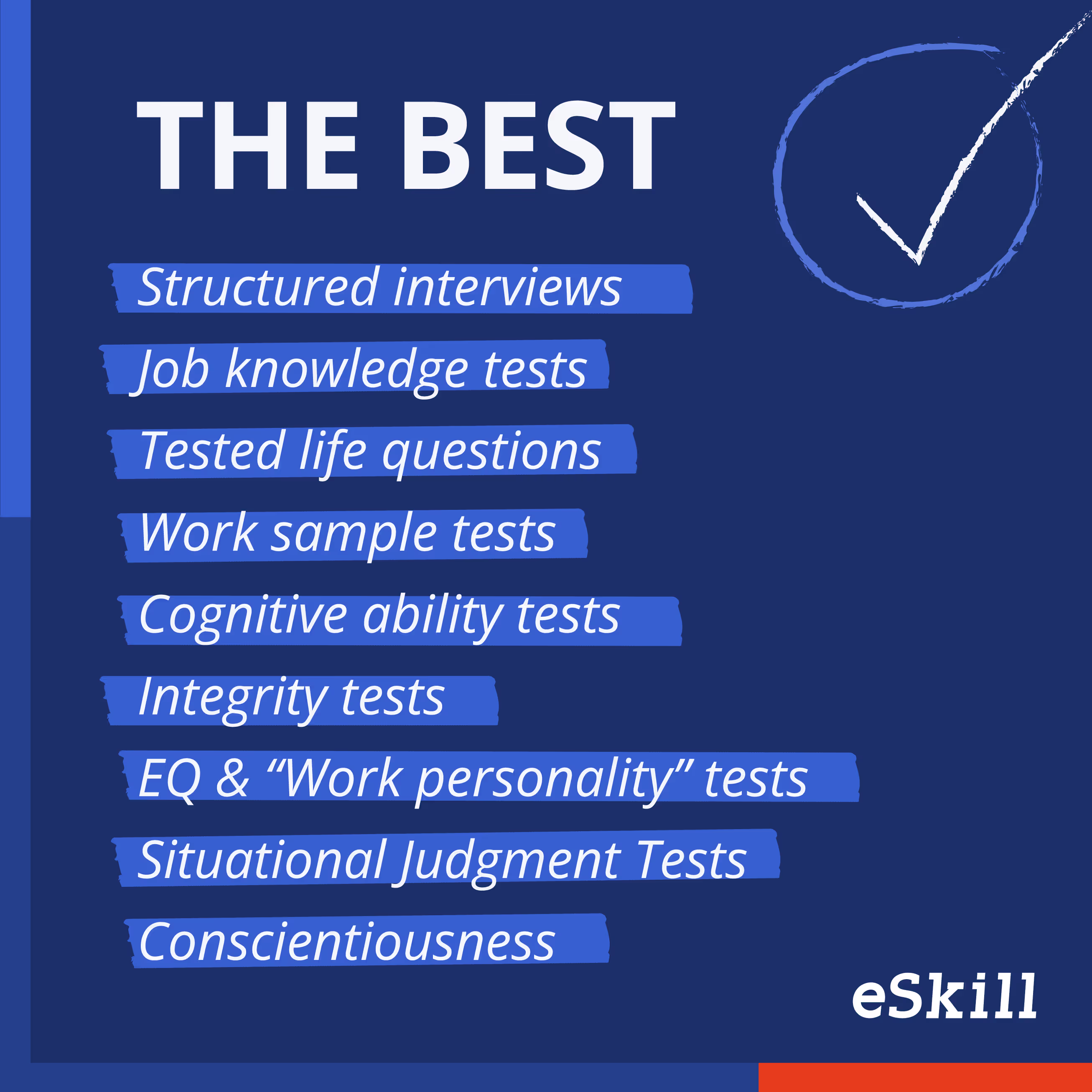
Structured interviews
In Sackett’s meta-analysis, he found that structured interviews, characterized by standardized questions and scoring systems, show the highest predictive validity for job performance among all the methods his team assessed.
Structured interviews had a validity coefficient of 0.42, making them significantly more predictive than resumes, unstructured interviews, or years of experience.
So what makes a structured interview “structured”?
- Every candidate is asked the same set of job-relevant questions. These questions are designed in advance to assess specific competencies or behaviors tied to job success — not just general likeability or experience.
- Responses are scored using a consistent rubric. Rather than relying on gut feel or memory, interviewers rate answers against clear benchmarks, making the evaluation more objective and replicable.
This structure not only helps reduce bias but also improves fairness and legal defensibility in hiring. According to the U.S. Office of Personnel Management (OPM), structured interviews are considered a best practice in federal hiring for their ability to consistently evaluate candidates across dimensions like problem-solving, communication, and adaptability.
Bottom line? If you’re only going to improve one thing in your hiring process, start by switching from unstructured to structured interviews. The difference isn’t subtle — it’s one of the clearest evidence-based upgrades an organization can make.
And if you don’t have the bandwidth or your candidates don’t have the time to engage in structured interviews (if they have difficulty taking off of work, for example), consider incorporating one-way interviews or video response questions into your hiring process. That way, you can cast a wider net — allowing for asynchronous interviews and scoring at any time.
Job knowledge tests
Job knowledge tests ranked second overall in predictive validity in Sackett’s 2022 meta-analysis — with a correlation of 0.4 to job performance. That makes them one of the most effective tools available for assessing how well a candidate is likely to perform in a specific role.
Unlike general cognitive ability tests, job knowledge tests focus on role-specific facts, concepts, procedures, and applied understanding. For example:
- A medical billing position might include questions on ICD-10 codes or HIPAA compliance.
- A mechanic might be tested on engine systems, safety protocols, or diagnostic procedures.
- A government administrative assistant might complete questions on document formatting and record-keeping protocols.
These tests are especially valuable when a role demands technical proficiency, regulatory knowledge, or specialized training. In those contexts, testing for job knowledge is often a stronger indicator of readiness than experience or even general intelligence.
One reason job knowledge tests perform so well is their high content validity: they measure what matters for the job. They're objective, and — when well-designed — highly fair and defensible. Unlike personality tests or open-ended interviews, they give candidates the chance to demonstrate whether they actually know how to do the work.
If you want to know whether a candidate is ready to hit the ground running, job knowledge tests can give you one of the clearest signals — especially when paired with structured interviews and real-world work samples.
Tested life questions
Sackett’s study refers to “empirically keyed biodata” as one of the top predictors of job performance. “Empirically keyed biodata” is a mouthful, and the term doesn’t reveal much about what it’s referring to. We're calling it "tested life questions," but what exactly is Sackett, and what are we, referring to?
Empirically keyed biodata refers to a type of biographical data used in hiring and personnel selection that is scored based on statistical relationships with job performance or other criteria, rather than logic or theory alone.
Biodata typically includes questions about a person's background, experiences, habits, attitudes, and values (e.g., "How many books did you read last year?" or "Have you ever been a team leader?").
In empirical keying, each possible answer to a question is given a score based on how strongly it correlates with success on the job, determined by data from existing or past employees.
This method doesn’t rely on how obviously the questions seem to be related to the job at hand. Instead, the focus is on predictive validity — whether the answer is actually linked to performance outcomes.
If people who answer "yes" to “Did you participate in team sports in high school?” tend to perform better in a collaborative job, that answer would be assigned a higher score — even if the connection isn’t obvious.
While questions like these are often more predictive of job success than traditional resumes or interviews, they may appear arbitrary to candidates and could even raise fairness concerns. However, that doesn’t stop them from having a high correlation to hiring outcomes, as revealed by Sackett’s study.
Work sample tests
Work sample tests, like job knowledge tests, are one of the top predictors of job performance. Unlike a job knowledge test, work sample tests are not based on what is covered in a job, but on a sample of material.
But what exactly are they?
Unlike job knowledge tests, which assess what a person knows about a role (like laws, procedures, or terminology), work sample tests evaluate what a candidate can actually do by simulating tasks similar to those performed on the job. In other words: don’t tell me — show me.
Here are some examples:
- For a customer support role: A simulated email exchange where the candidate must respond to a difficult customer complaint using the company’s tone and policy guidelines.
- For a data analyst position: An online Excel simulation test asks the candidate to clean and analyze a dataset, then present insights in a brief summary.
- For a warehouse job: A hands-on test where the candidate moves and scans inventory using tools similar to those in the real workplace.
Work sample tests provide one of the strongest signals of future performance because they directly assess job-relevant behavior in a realistic context. Unlike interviews — where candidates can prepare and perform — work samples reflect actual skill and problem-solving under real-world conditions.
Work sample tests are valuable because they give candidates a sense of what the job really entails, improving mutual fit. They also have high face validity, since candidates can see that they relate directly to the job. And if candidates find they don’t know how to do the work at hand — they might choose to self-select out of the application process, saving both the organization and the applicant time.
Of course, designing a good work sample test takes time. But if done well, it’s one of the most effective tools for surfacing top performers before they’re hired — and a hiring assessment platform like eSkill can make the process a whole lot easier.
Cognitive ability tests
For decades, cognitive ability tests were considered the gold standard in hiring — thanks largely to the influential 1998 meta-analysis by Schmidt & Hunter, which ranked them as the strongest single predictor of job performance. Their research showed a validity coefficient of 0.51, cementing “general mental ability” as the top hiring metric in industrial-organizational psychology.
But more recent research — most notably Sackett et al.’s 2022 meta-analysis — has re-evaluated that conclusion, taking into account broader job contexts, more rigorous definitions of performance, and new forms of assessment.
So the result? Cognitive ability is still important — but not the top predictor it was once believed to be. In Sackett’s analysis, it ranked fifth.
And what exactly do cognitive ability tests measure?
They assess a person’s capacity to perform a range of mental tasks, such as the ability to solve problems, understanding written material, applying logic and reasoning, and organizing information. These skills correlate with how well someone learns new tasks, adapts to change, and handles complexity on the job.
Cognitive ability tests still have a place in hiring — especially for roles that demand learning agility, reasoning, or multitasking. But if you're looking for the best predictors of real-world job performance, you’re better off combining them with job-relevant assessments like work samples or job knowledge tests.
Integrity tests
Integrity tests are designed to assess a candidate’s likelihood of engaging in counterproductive work behaviors: things like theft, dishonesty, absenteeism, or rule-breaking. Despite being lesser-known than interviews or skills tests, integrity assessments ranked surprisingly high in Sackett’s meta-analysis, outperforming years of experience, interests, and general personality inventories.
So why should — or do — employers use these tests?
They predict both job performance and misconduct. In fact, integrity tests tend to be stronger predictors of counterproductive work behavior than performance itself, making them especially useful for roles with high trust or compliance demands (like retail, finance, and logistics).
While useful, integrity tests should never be used in isolation. False positives can occur, especially with cultural or language differences, and overly invasive questions may deter good candidates. The best approach is to combine integrity testing with structured interviews, cognitive assessments, or job knowledge tests for a more balanced picture.
Emotional Intelligence & “Work personality” tests
Traditional personality tests — like those based on the Big Five — often fall short when it comes to predicting job performance. Why? Because they're too broad. Asking someone how they behave "in general" doesn’t always translate to how they'll act on the job.
But when personality assessments are contextualized (meaning they specifically ask how someone behaves at work) their predictive power improves significantly. For example, instead of asking “How organized are you?” the question becomes “How organized are you at work?” That slight shift in wording makes a big difference.
This concept is backed by research from Sackett and colleagues, who argue that “work personality” tests should be considered a distinct category — not just a minor variation of general personality tests. When personality questions are grounded in real workplace scenarios, they become more relevant and more predictive of actual on-the-job behavior.
Similarly, emotional intelligence (EI) assessments can add meaningful insight — especially for roles that demand collaboration, empathy, or conflict resolution. While the predictive validity of EI alone tends to be modest (typically around 0.30, according to meta-analyses), it becomes particularly valuable when combined with other soft skill indicators or used in hiring for leadership, customer-facing, or high-stakes interpersonal roles.
In short, generalized personality tests offer limited hiring value. But when refined into work-specific formats — especially when combined with emotional intelligence measures — they become much more useful tools for selecting candidates who will thrive in your organization.
Situational Judgment Tests
Situational Judgment Tests (SJTs) present candidates with hypothetical, job-relevant scenarios and ask them to choose (or rank) the most appropriate responses. These tests are designed to measure practical decision-making, interpersonal judgment, conflict resolution, and emotional intelligence — especially in contexts where the “right” answer may not be obvious.
They measure soft skills that matter on the job: teamwork, leadership, ethics, conflict resolution, and customer service.
They’re especially effective when customized to specific roles — for example, an SJT for a nurse might present a triage dilemma, while one for a sales role might deal with a difficult client. They simulate on-the-job thinking without requiring a full work sample.
They also have low adverse impact. Research shows SJTs have lower risk of bias against underrepresented groups than cognitive ability tests — making them attractive for diversity-conscious hiring.
Because the questions are realistic and job-related, candidates often perceive SJTs as more fair and engaging than abstract tests.
Conscientiousness
Most employers would agree that they prefer employees who are organized, act responsibly, meet deadlines, and plan ahead. These behaviors are all linked to a single trait: conscientiousness.
Research suggests that conscientiousness is the only major personality trait that consistently predicts success on the job. High-conscientiousness individuals tend to follow through on commitments, plan ahead, meet deadlines, and take their work seriously. It doesn’t seem to matter which job, either; conscientious candidates are likely to perform well across a wide variety of roles.
To test a candidate’s conscientiousness, you can ask them to complete a “Big Five” personality test or ask behavioral questions that examine how conscientiously they behaved in previous roles.
According to decades of personality research — including Sackett and Schmidt & Hunter — conscientiousness outperforms other Big Five traits like extraversion, agreeableness, and openness when it comes to actual job outcomes.
Best Combinations
Combining the top predictors of job performance can help you create a winning strategy for finding the right people for the job.
A point that Sackett and his colleagues make in the study (that we think is important to point out) is this: they note that “traditional in-person form, structured interviews are generally not a viable strategy for high-volume jobs, with interviews commonly used among a smaller subset screened via less time-intensive predictors.”
With many of the top predictors of job success all structured as tests, to reach this smaller subset, job-specific assessments may just be the stepping stone needed.
“Traditional in-person form, structured interviews are generally not a viable strategy for high-volume jobs, with interviews commonly used among a smaller subset screened via less time-intensive predictors.”
Paul R. Sackett et. al., “Revisiting Meta-Analytic Estimates of Validity in Personnel Selection” in the Journal of Applied Psychology, 2022
Where eSkill Fits In
While it’s tempting to use first impressions and metrics like “years of experience” to weed out candidates, this is the better way to do some of the heavy lifting early on in the hiring process. By integrating pre-hire assessments into your hiring process, you can then target a smaller pool of candidates with the next step — well-thought out structured interviews.
eSkill can make hiring the best candidates an easy process — and one based on hard data. Not only can you test based on hard skills and work sample simulations, but we also provide behavioral, situational judgment, emotional intelligence, and integrity tests for you to choose from. These work-specific assessments can be customized to your liking — so you can edit them to the exact role you’re hiring for. You can combine all the best hiring methods into one flexible, reliable toolset, all housed on one platform.
According to Sackett's 2022 meta-analysis, 8 of the top 10 predictors of job performance are test-related.
When you implement a skills-based assessment in your hiring process to weed out unqualified candidates, you can spend more time on the interview stage and other important predictors in the hiring process.
And the answer to the riddle? It’s 14.
The answer might not be able to get you a job anymore (or hire someone for a job), but at least candidates and recruiters can focus on what really matters — and it’s definitely not about throwing eggs off a 100-story building (unless you’re hiring a physicist?).


